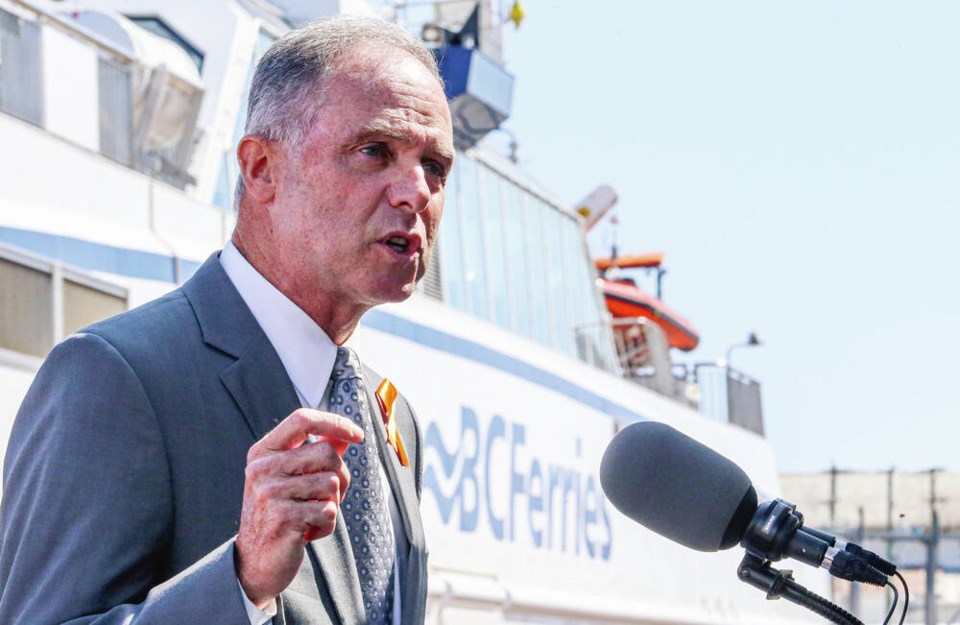It has been 22 years since Joy MacPhail had anything to do with B.C. Ferries and she still has a certain swashbuckling touch.
Installed as the chair of the ferry corporation’s board of directors scarcely a month ago, she had her first meeting with CEO Mark Collins on Thursday.
In normal circumstances the two would have covered a range of topics while getting to know each other. But it turns out there was only one item on her agenda: “Let’s go for a walk on this plank, Mark. You go first…”
The NDP’s convoluted effort to reassert full political control of the weirdly-structured corporation has finally paid off, with her dismissal of Collins.
The government introduced a bill to reassert its authority in March, but didn’t bother to get it passed. It would have gutted the nominally independent board and shifted all the power to a different oversight board directly controlled by the government.
Later on, a half-dozen vacancies appeared on the B.C. Ferries board. The appointment of MacPhail and others, and their quick decision to fire the boss, makes clear the end result has been achieved, regardless of the bill’s stall-out.
MacPhail’s last appearance on the bridge at the turn of the century was similarly dramatic.
Ujjal Dosanjh, then premier, made her minister responsible for the fleet in the spring of 2000 after he took over from Glen Clark, who was responsible for the fast-ferry fiasco.
Her first job back then was to vividly acknowledge the scale of that half-billion-dollar mess, which transfixed taxpayers and sealed the NDP’s loss (77-2) in the subsequent election. At an epic news conference, she said the over-budget, under-performing catamarans, which by then were a provincial joke, were “a risk, and we have all paid the price. It was a mistake and the experiment didn’t work.”
She wrote down the three brand-new $460 million boats to a nominal $40 million apiece, and moved a billion dollars worth of ferry debt over to taxpayers.
They were eventually sold off by the incoming B.C. Liberal government for next to nothing.
Compared with that adventure, firing a B.C. Ferries CEO is like sailing a model boat.
Friday’s official version of the dismissal tried to portray it as mildly as possible. “We thank Mr. Collins for his hard work and dedication. … We wish him well in all future endeavours,” MacPhail said.
She also lauded his accomplishments in terminal upgrades, fleet renewal and fare innovations. To make the “no hard feelings” clear, she’s buying out his contract with full severance, yet to be determined.
So why was he fired?
The statement alludes to staffing shortages, service interruptions and pandemic challenges. “There are no quick fixes … but we believe it is time for renewal, fresh ideas and a renewed commitment to the highest standards of customer service.”
In short form, the service, as with every other transportation outfit in the world, has eroded so much, mostly due to COVID absenteeism, they had to do something major.
And part of every CEO’s job is to take one for the team.
Behind that polite outline of events, there was a serious argument between Collins and the premier’s office over his response to the pandemic. When virtually all traffic stopped in the early days and B.C. Ferries was losing $1 million a day, he tried to lay off about 1,000 employees.
That effort stalled out in labour arbitration, but it enraged senior NDP government officials.
The statement said a “robust and professional” search for a new CEO will be launched. That suggests that it will take several months to find one. So the immediate fixes to improve service levels that are so badly needed will fall to Jill Sharland, the capable chief financial officer who is now interim CEO.
There are two key things to watch. The first is whether the successor comes from within the ranks of the corporation or the broader public service, or from outside. NDP mistrust of the corporation, based on how the B.C. Liberals set it up as publicly owned but privately run, could extend to the executives in charge.
The other is the new board of directors, newly empowered with multi-year terms, led by a 1990s-era NDP figure who has first-hand experience in dealing with maritime disasters.
The last line of Friday’s statement assured people that the board “will continue to provide oversight in the day-to-day operations of the ferry company.”
I just bet it will.
>>> To comment on this article, write a letter to the editor: [email protected]



